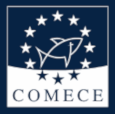The quick development of new technologies based on Artificial Intelligence (AI) is leading COMECE to publish the reflection “Robotisation of Life – Ethics in view of new challenges”. The document reaffirms the primacy of the human person and promotes a right-based and person-centred approach in reviewing the main principles that define the relationship between human persons and robots.
Produced by an ad-hoc working group on robotisation established by COMECE, the reflection comes in a moment of intense discussion about the importance of Artificial intelligence at the EU level.
This ongoing debate – in the context of which a statement on “Artificial Intelligence, Robotics and Autonomous Systems” was issued by the European Group on Ethics in Science and New Technologies, and the first draft of “Ethics Guidelines for Trustworthy AI” was published by the recently established High – Level Expert Group on Artificial Intelligence – reveals the increasing number of urgent and complex moral questions in this domain. It also highlights the need for defining an ethical and legal framework for the design, production, use and governance of Artificial Intelligence.
Led by Prof. Antonio Autiero and enriched by diverse contributions of experts in theology, philosophy, law and engineering, the COMECE ad-hoc working group analysed the impacts of robotisation on the human person and on society as a whole and elaborated its reflection as an ethical step which can shape community life in our complex and globalised society in which actors are increasingly interconnected.
Acknowledging the necessity of clear guidance for the future of the next generations, and convinced that no unconditional or emphatic acceptance of Artificial Intelligence is possible, this COMECE reflection encourages a review of the current principles, reaffirming the primacy of the human, on the basis of the recognition of the human dignity of each person.



